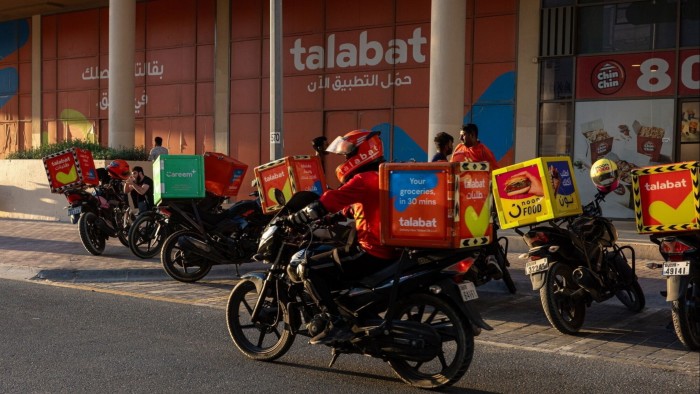Unlock the Editor’s Digest for free
Roula Khalaf, Editor of the FT, selects her favourite stories in this weekly newsletter.
Middle East-based food delivery company Talabat has raised $2bn in the Gulf’s biggest initial public offering this year, as the region bucks a global downturn in flotations.
Talabat, which is German group Delivery Hero’s food delivery and quick commerce business in the Middle East and north Africa, priced its IPO at Dh1.60 per share, it said on Friday. That gives it an implied market capitalisation of about Dh37.3bn ($10.1bn) — just below its Frankfurt-listed parent company, which is worth $11bn. It will list on the Dubai stock exchange.
The move helps keep the United Arab Emirates, which has exchanges in both Dubai and Abu Dhabi, on track to raise more money through IPOs than any other nation in the Europe, Middle East and Africa region for the third year running, according to Dealogic data.
Demand for IPOs in the UAE has recently been boosted by “a lot of investors moving here, which also created more awareness or comfort with the strength of the region”, said Miguel Azevedo, Citigroup’s investment banking vice-chair for the Middle East and Africa. “People see the GDP growing on the streets.”
He added: “In 2022, 2023 and even a bit of 2024, international markets have not been very active. So it also makes the burst of activity here in the region more visible when you put it in an international context.”
Regional rival Riyadh’s stock exchange typically has many more IPOs than the UAE — more than four times last year — but the size of IPOs in the UAE has been higher.
Talabat’s chief executive Tomaso Rodriguez said it made sense to list in Dubai because it is where the business is based and “we see a lot of interest from local and international investors in Dubai as a hub”.
The UAE’s surge in IPO activity in recent years marks a major turnaround for its capital markets. Having not made it into the top 10 Emea markets for value of IPOs for three straight years from 2018 to 2020, the UAE surged from ninth place in 2021 to first in 2022. It ranked fourth globally last year, behind China, the US and India, Dealogic data shows.
The surge has been jump-started by government efforts to sell shares in state-owned businesses. Oil-rich Abu Dhabi hoped flotations would improve governance levels and other business performance, while Dubai wanted to shake up its capital market, which it had struggled to revive after the 2008 financial crisis and where it was losing ground to Saudi Arabia and neighbouring Abu Dhabi.
Abu Dhabi’s state energy company floated its fuel distribution unit in 2017, raising about $850mn. Dubai’s state utility company raised $6.1bn in 2022, and state parking group Parkin raised $429mn this March.
The move towards privatisation has spread to neighbouring Oman, which boasted the region’s joint-largest IPO this year with a $2bn listing of a state-owned pipelines business. It raised fractionally less than Talabat.
But in the UAE, a growing share of listings are by private companies such as Talabat, buoyed by investors wanting access to growing Gulf markets.
Regional supermarket chain Lulu Retail raised $1.7bn on the Abu Dhabi stock exchange this month and high-end grocer Spinneys raised $375mn in May through a Dubai listing.
Talabat shares are expected to start trading on December 10 after the offering attracted “a double-digit oversubscription level”, according to the company. Their performance will be closely watched by investors, after the lacklustre debuts of Lulu Retail and Oman’s OQ Exploration and Production.
Delivery Hero earlier this week said it was increasing the size of the IPO to 20 per cent of Talabat, up from 15 per cent. It intends to retain a long-term majority indirect ownership position.
The IPO “not only demonstrates the region’s buoyant market but also provides Delivery Hero with capital for growth while maintaining majority control”, said Alex Frederick, senior emerging technology analyst at market data company PitchBook.
In third-quarter results earlier this month, the German group reported that the total value of goods sold by its Middle East and north Africa business had grown 30 per cent year on year to €3.2bn, above the overall group’s 9 per cent growth.
Read the full article here

